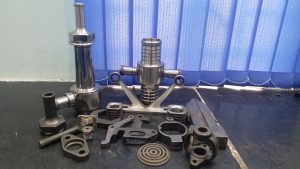What is the Significance of Using Aluminum Alloy?
Aluminum alloy usually consists of a scientific combination of two or more metals. The notable trait of the alloy is that the blend contains more quantity of aluminum than other metallic elements. Copper, zinc and manganese are typically used in this mixture. Aluminum alloy casting is more popular among the industry over any other alloy casting. And, according to a leading Alloy Steel Casting Manufacturer, this popularity of aluminum alloy is certainly the outcome of several benefits that it provides. Some of them are as follows:
• Strength – With right alloying and proper treatment, aluminum alloy can be found in various strengths. Some alloys come with strength of 300 MPa and that is stronger than even some kinds of steel. Strength of the alloy is usually selected to match the product requirements.
• Strength at low temperature – Brittle fracture issues hardly happen with aluminum. With fall in temperature, this alloy increases its strength sans any quality compromise. And, that certainly makes it a preferred choice for low temperature applications. Aluminum alloys are often used for LNG tankers, LNG storage tanks and cryogenics.
• Non-toxicity – Aluminum is odourless and non-toxic. It has a smooth surface that can be washed easily. It is hygienic too allowing no bacteria to grow on its surface. These are the reasons that aluminum is widely accepted and used for food packaging as well as manufacturing beverage cans, cooking utensils. It is also used in dairy and fishing industries.

• Corrosion resistance – While aluminum gets exposed to the air, a thin oxidized film generates on the surface that protects the metal from potential corrosion. While scratched, this film or layer can rapidly reform to carry on with due protection. This feature comes extremely handy for building construction and manufacturing household utensils. Alloy casting manufacturers including Alloy Steel Casting Manufacturer especially prefer this feature in their chosen metal.
• Conduction of heat – Aluminum is an extremely good conductor. It conducts heat much better and more efficiently than any other metal. It has almost three times thermal conduction capacity than that of steel. Thus, aluminum is extremely important in applications that require heat exchange – be it heating or cooling. It is also used in chemical, food, aircraft, petroleum and automobile industries.
• Electrical conduction – Aluminum can conduct electricity about 62% times more than that of copper while weighing only 1/3rd of copper. This feature ensures that it conducts almost 2x more electricity than copper equivalent in weight. Besides, aluminum is extremely economical especially as a good electrical conductor. Thus, it is often used in power transmission cables as well as base of electric bulbs and in other electrical fields.
• Non-combustion – It doesn’t burn and thus it is commonly used in vehicles, buildings as well as other applications where fire is a big hazard. Hazardous emission is not generated while aluminum gets exposed to heat.
• Non-sparking – The non sparking trait of aluminum makes it a preferred choice for products used with explosives or high flammable materials.
• Non-magnetic – This unique property of aluminum makes it useful for a wide range of electronic as well as electrical applications like busbars, high-voltage hardware, magnetic compasses, computer discs and parabolic antennas.


